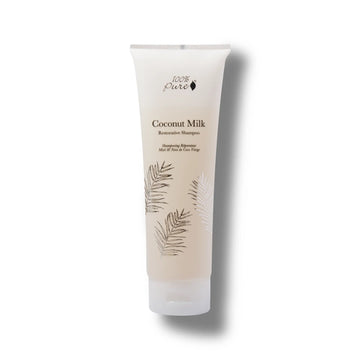We’re Highlighting Which Chemicals to Avoid in Natural Cosmetics, And What to Use Instead!
Written by: 100% PURE®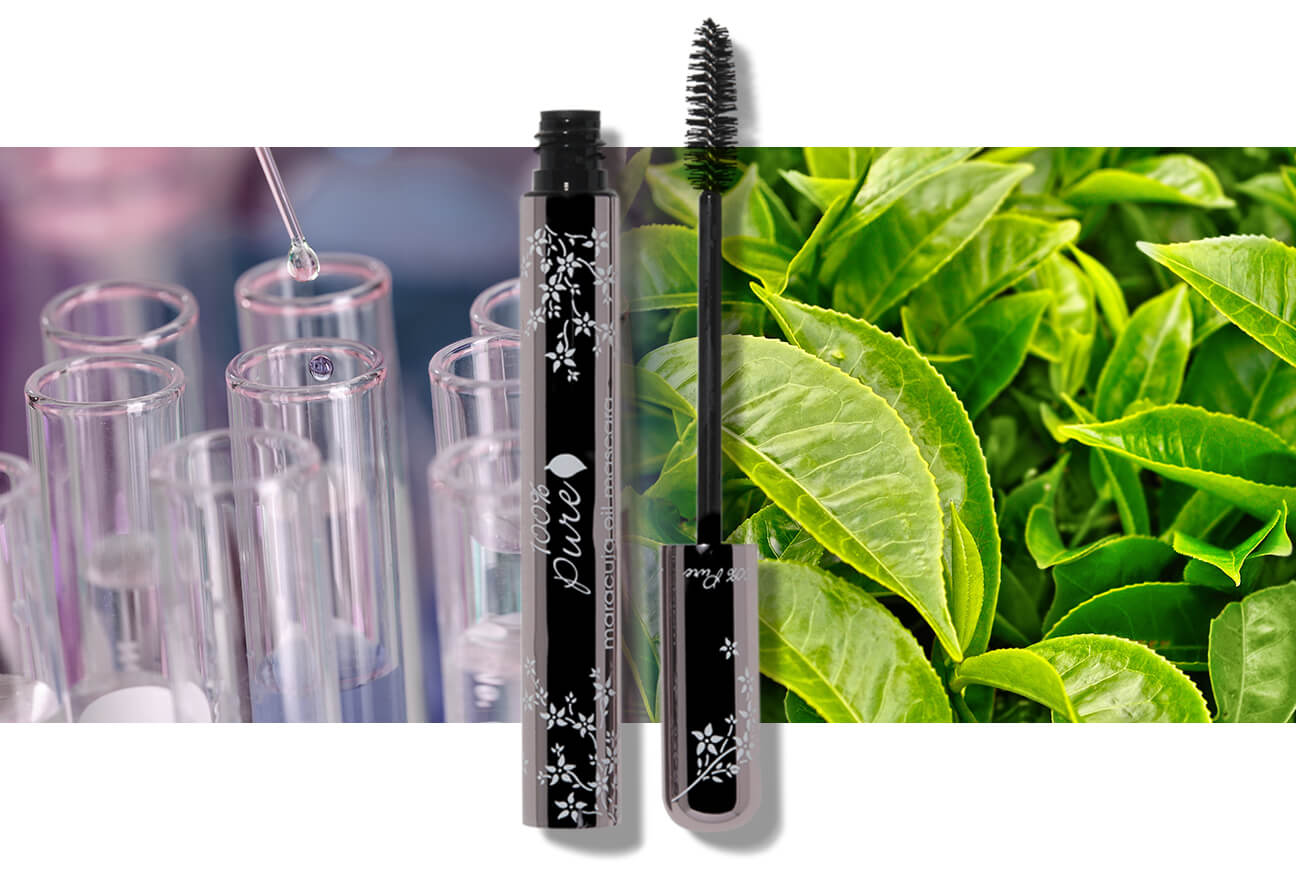
Are you a makeup addict? Do you use conventional beauty products, but forget to do a thorough check of the ingredients list before using them? Well, those cosmetics are often chock-full of toxic and synthetic chemicals that can build up in your body over time.
These synthetic ingredients can wreak havoc on your hormones, digestion, and skin health – not exactly an ideal tradeoff for a short-term beauty fix. Makeup that’s free of (not loaded with) harsh chemicals should be the norm!
We’ve rounded up a list of synthetic chemicals you should be avoiding on product ingredient lists, and what alternatives to choose that we use in our fan-favorite beauty products. Synthetic-free makeup performs just as well - and we’d argue even better - than conventional makeup because it provides vegan, skin-friendly ingredients! With smart swaps, you can have your ‘vegan’ cake and eat it too.
Chemical-Free Makeup Vs. Synthetic-Free Makeup
To make better beauty decisions that show love to your skin, body, and the environment, step one is to do your ingredient homework. If you’re reading this, congrats! You’ve completed step one! Our mandate at 100% PURE is to replace the toxic ingredients often found in conventional makeup with natural alternatives. We use non-toxic, synthetic- and cruelty-free ingredients that are sustainable and environmentally friendly.
We adhere to a very strict formulation process for our products, and it includes careful ingredient sourcing with the usage of certain chemicals. While ‘chemicals’ might sound like something you should avoid, some of them are actually natural and beneficial for the skin.
If a substance has undergone a chemical change from a natural biological process, the product is still natural. If a synthetic chemical or process was used to create a substance or reaction, the product is not natural. This is the basic definition of natural by the USDA, and that’s good enough for us. So, when you’re looking for makeup, choose something that’s free of synthetics, not necessarily chemicals.
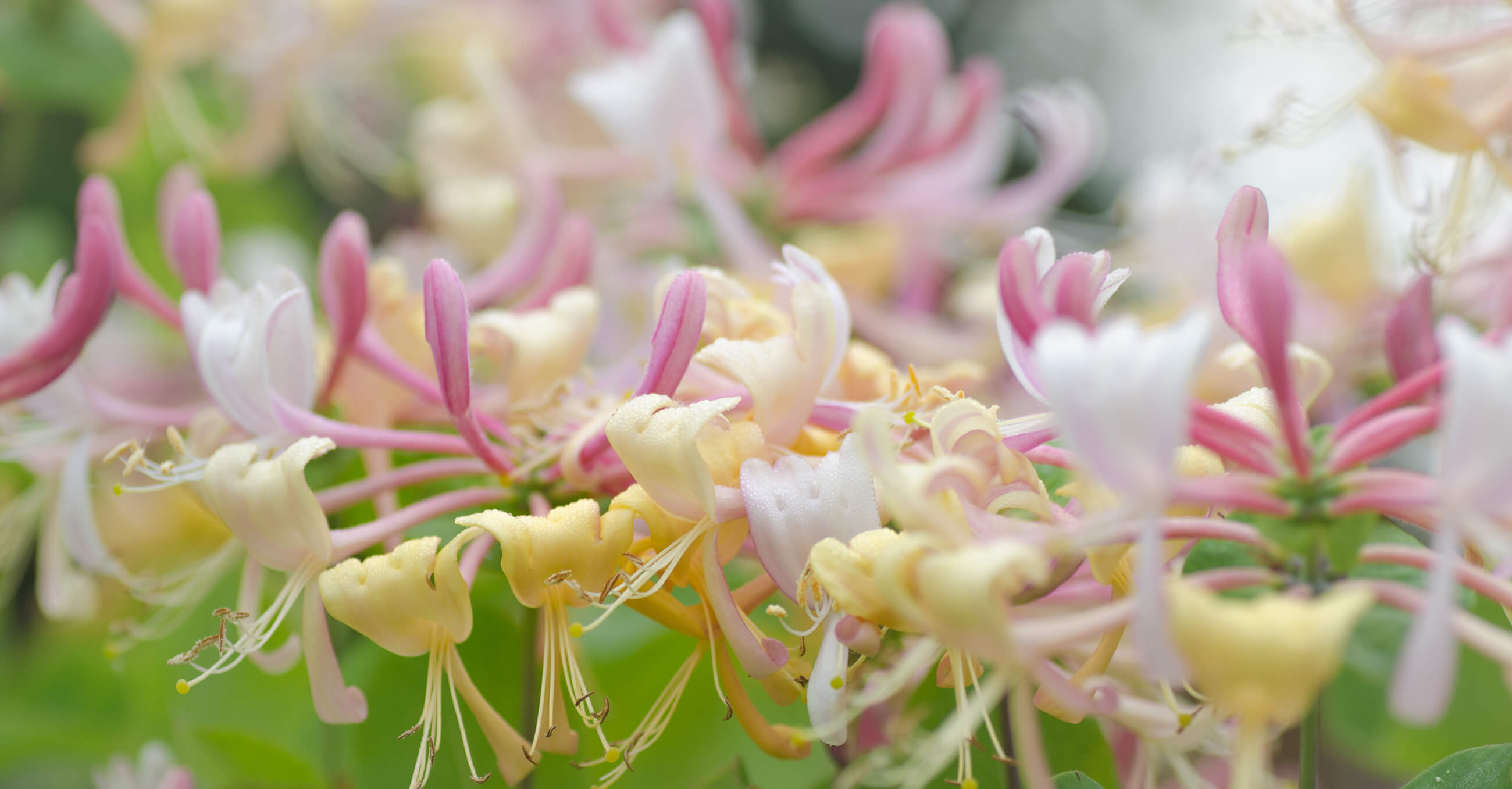
Avoid Toxic Preservatives
There are several toxic preservatives, which are used to extend the shelf life of products and prevent the growth of harmful bacteria and mold, commonly found in conventional cosmetics. While preserving organic formulas is a necessity (we get that you don’t want your face mask growing mold), we’ve managed to find natural alternatives to these toxic preservatives.
Still not sold on the importance of synthetic-free makeup? Just check out our list below. Some of the health concerns attached to these ingredients are of great concern.
Parabens are preservatives found in conventional cosmetics and are usually labeled methyl-, ethyl-, propyl-, isopropyl-, butyl-, or isobutyl parabens. Research around their health effects have revealed them to be endocrine disruptors. This means that over time, they disrupt the normal functioning of hormones, potentially leading to conditions like adult onset acne, issues with menstruation and mood, and more serious hormonally related cancers. Their estrogen-mimicking properties can cause either overproduction or underproduction of estrogen.
Because parabens are absorbed through the skin and can remain in your body for long periods of time due to their fat-soluble nature, they accumulate internally with extended use. What this means is that the longer you use parabens, the more at risk you are. This all said, we’ve nixed them from our ingredient list in favor of a natural alternative (more on that below).
The preservative watch list doesn’t end with parabens. We’ve also nixed BHA (Butylated Hydroxyanisole) and BHT (Butylated Hydroxytoluene), two petroleum-derived synthetic antioxidants that are used to produce a plastic or elastic consistency in cosmetics. They are also used to maintain the color and appearance in a formula over time. These two offenders are typically present in lipsticks (also in eyeshadow, blush and a host of other cosmetics), despite that they’re known allergens which often cause allergic contact dermatitis when used by individuals with sensitive skin.
Moreover, research has concluded that long-term exposure to BHA and BHT at high doses can be toxic, and they are still being evaluated as possible human carcinogens by the National Toxicology Program 2016 report on carcinogens. Good thing we’ve opted out of using them for our synthetic-free makeup.
What else is on the preservatives naughty list? Formaldehyde is a colorless, strong-smelling gas used in a wide range of industries and products, including building materials, walls, cabinets, furniture and personal care products. It’s found in a wide variety of cosmetics, ranging from hair relaxing treatments (the infamous Brazilian blowout) to nail polishes, hair gels, and deodorants. It’s used for its properties as a preservative at keeping products free from contaminants and bacteria, but its side effects include skin irritation, scalp burns, hair loss, and irritation to eyes, nose and throat. Best to steer clear of this stuff!
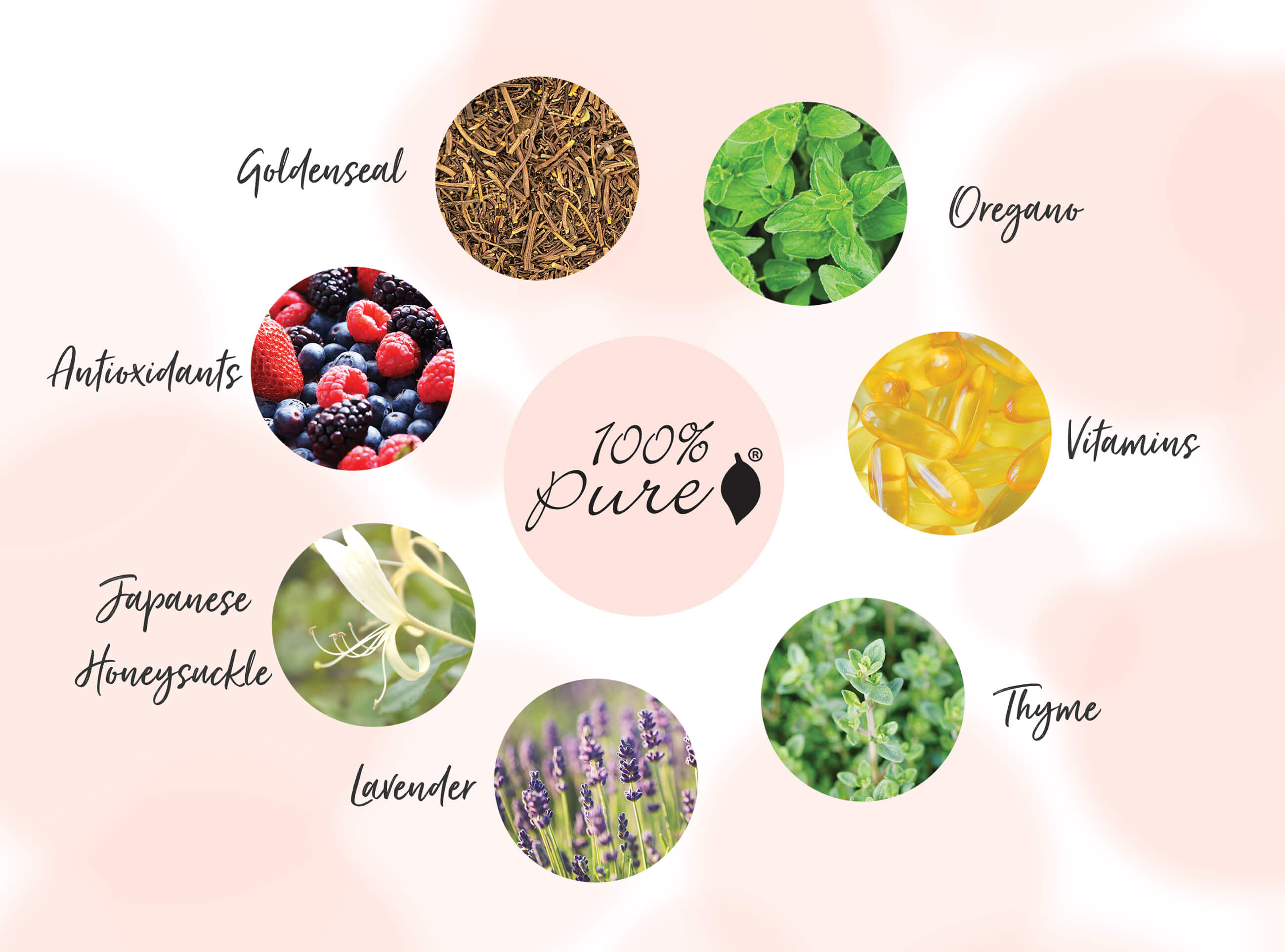
Natural Preservatives in Synthetic-Free Makeup
Since there is quite a bit of preservatives on the cosmetic blacklist, what’s a natural beauty company to do? At 100% PURE, we use Japanese honeysuckle as an antimicrobial preservative. Using either a steam distillation or alcohol extraction procedure, Japanese honeysuckle can be converted into phytochemicals with strong antimicrobial and antibacterial features.
Once converted, Japanese honeysuckle functions as a naturally derived preservative that effectively keeps bacteria and mold out of our makeup and skin care products, without compromising long-term and internal health. It’s a body-loving alternative that’s allowed us to avoid toxins while maintaining the integrity and shelf life of our cosmetics.
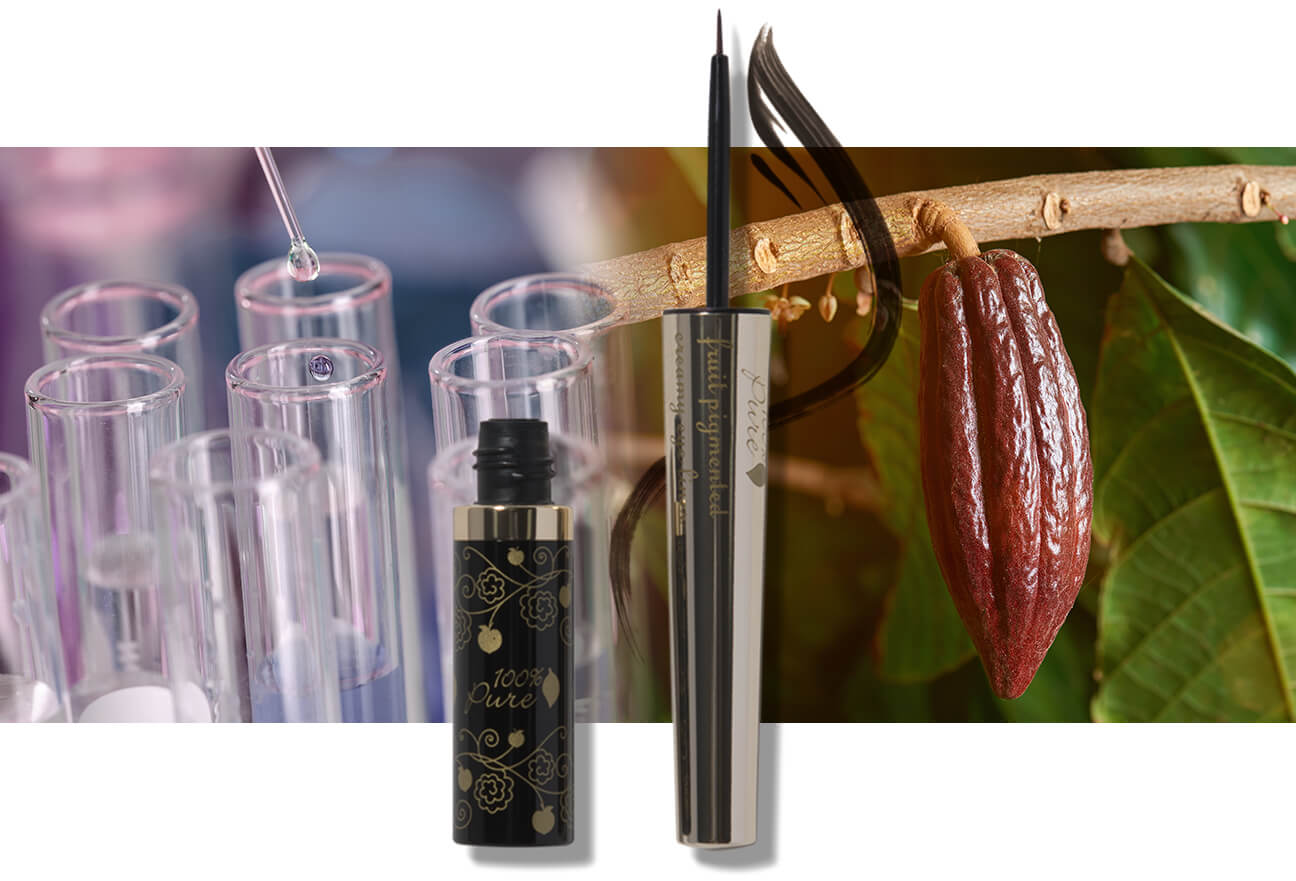
In products like our Long Lasting Liquid Eyeliner, our formula features Japanese honeysuckle extracts to keep the highly-pigmented liquid liner long lasting, richly textured, and with an ultra-smooth application. Plus, this must-have eyeliner is formulated with black tea leaves instead of synthetic dyes, so its rich hue keeps your eyes dark and romantic, not dried out and damaged.
While Japanese honeysuckle might be our main squeeze when it comes to preservatives, it’s backed up by an impressive supporting cast. We also use thyme, oregano, goldenseal, rosemary, lavender, and a super high concentration of antioxidants to keep our products fresh, long lasting, and free of bacteria.
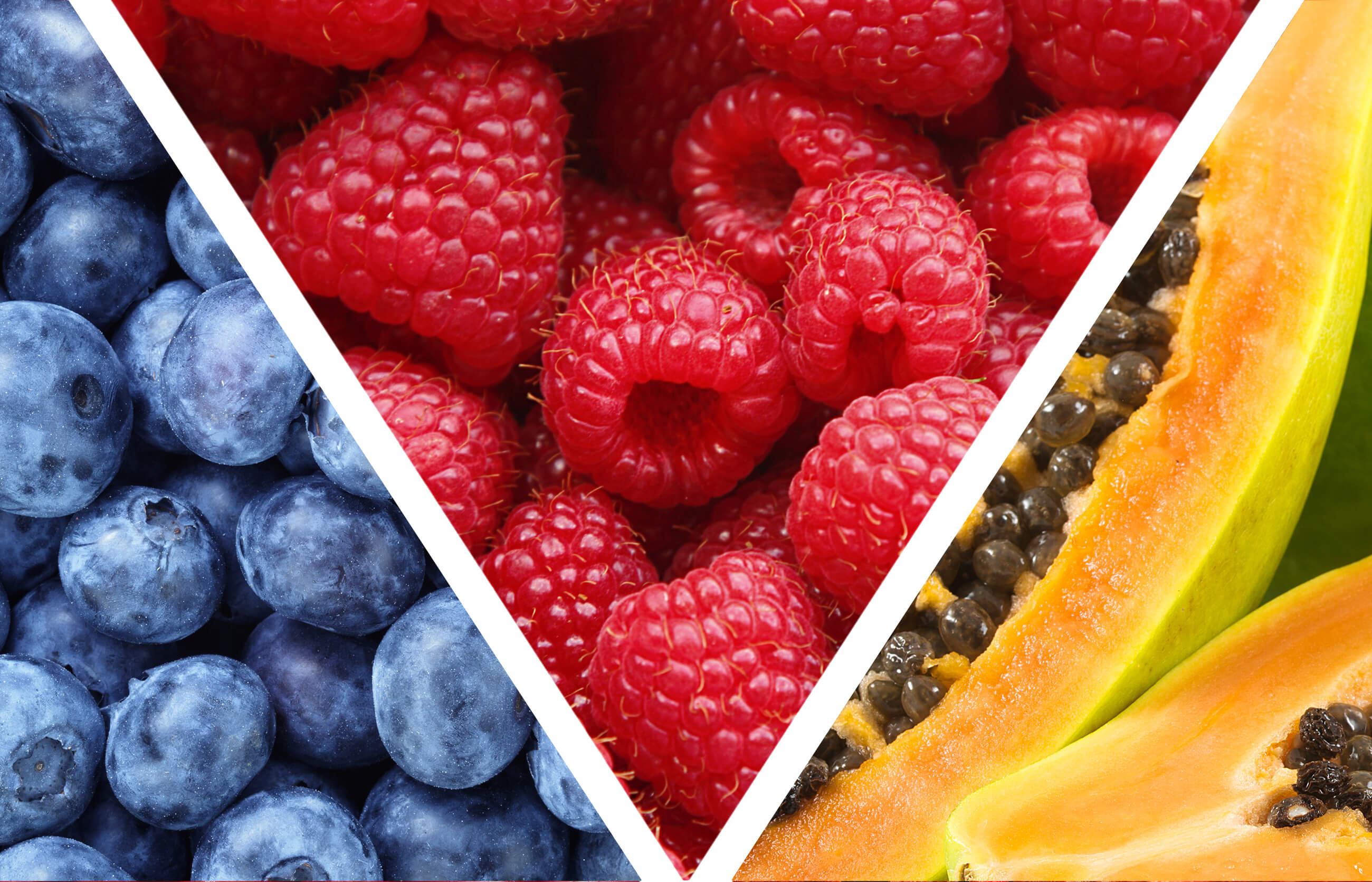
Say No to Synthetic Dyes
This brings us to the next offender on the toxin list: synthetic dyes. Conventional cosmetics are typically formulated with non-naturally occurring dyes derived from petroleum and coal tar sources. They’re known human carcinogens at high levels of exposure, are skin irritants, and are linked to ADHD in children.
Additionally, these synthetic colors are known to be contaminated with low levels of heavy metals and aluminum compounds, which are known toxins to humans. Canada’s Cosmetic Regulations prohibit most coal tar based synthetic colors in eye makeup and other products used in the eye area, but these synthetic colorants are still largely used in other cosmetics, and in other countries.
Natural Fruit Pigments in Synthetic-Free Makeup
We steer clear of tar and petroleum based dyes in our mascaras. Our much loved Maracuja Mascara is pigmented from berries, cocoa, and coffee beans, for a sultry dark hue sans potential eye damage from conventional eye makeup. It’s a lash-volumizing and growth-encouraging formula that moisturizes with vitamin E and maracuja oil, and keeps your lashes healthy, richly hued, and high drama.
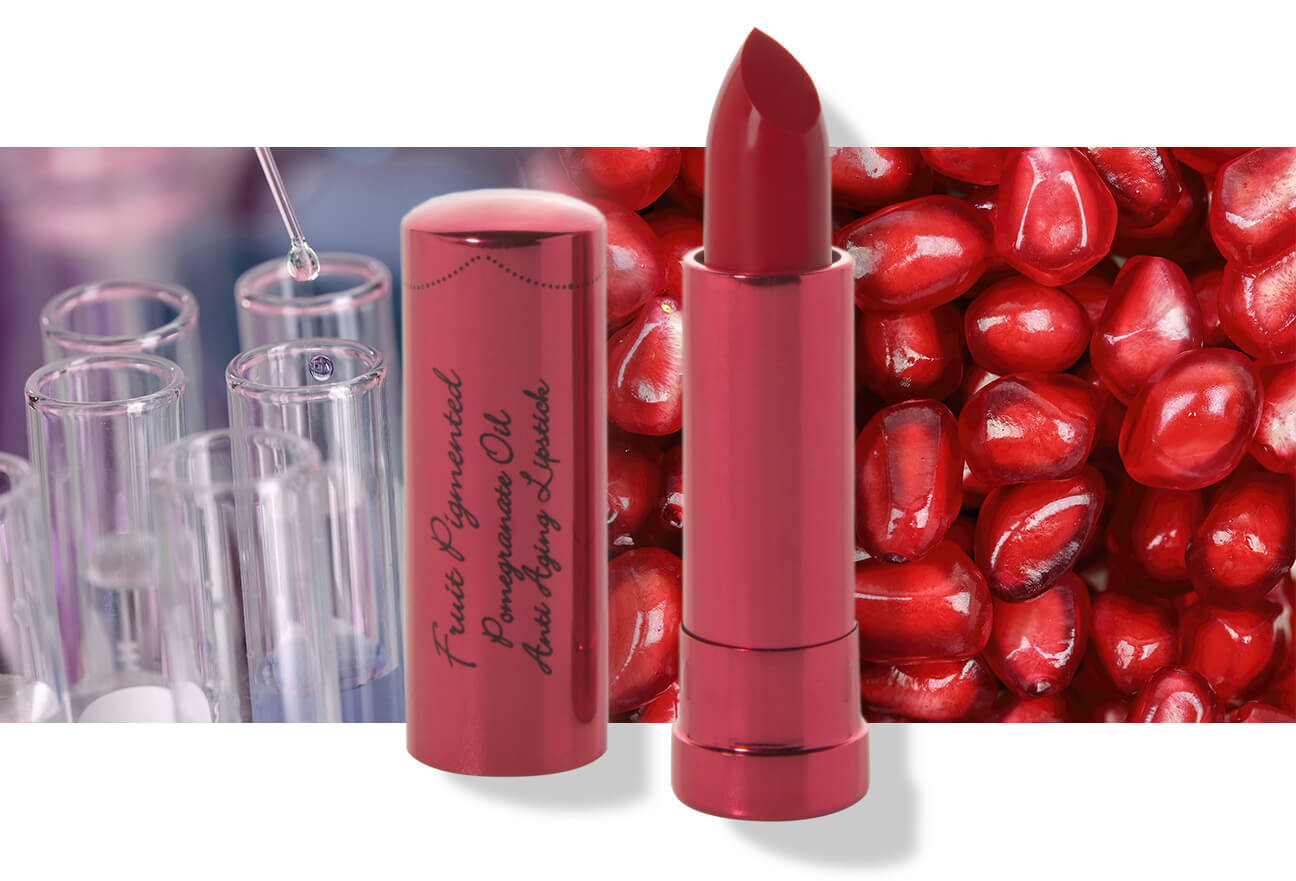
We’ve made it a point to omit these toxins from our formulas, and, instead, use antioxidant-rich fruit and plant pigments to provide rich color to our lipsticks and mascaras. Our Fruit Pigmented® Pomegranate Oil Moisturizing Lipstick comes in a super wide range of bright hues. We’ve crafted our line of colors from an array of fruits and berries – think cherry, cabaret grapes, blackberry, apricot, and cacao pigments - plus more!
Not only are we able to mix a nearly unlimited array of gorgeous colors using entirely plant- and fruit-based ingredients, in using natural pigments we effectively enhance our formulas with a powerful antioxidant kick, which prevents environmental damage to the fragile skin on our lips and encourages healthy skin cell production. It’s a skin win-win!
Harsh Detergents
Products that promise to cleanse your dermis and remove oil and excess sebum are often full of harsh and irritating detergents. You may recognize them as sodium lauryl sulfate and sodium laureth sulfate. Derived from petroleum, these ingredients are often contaminated with pesticides and can lead to skin rash and worsening of conditions like acne and eczema – plus it’s a red flag that they’re the number one ingredient in industrial cleaning agents like engine degreaser.
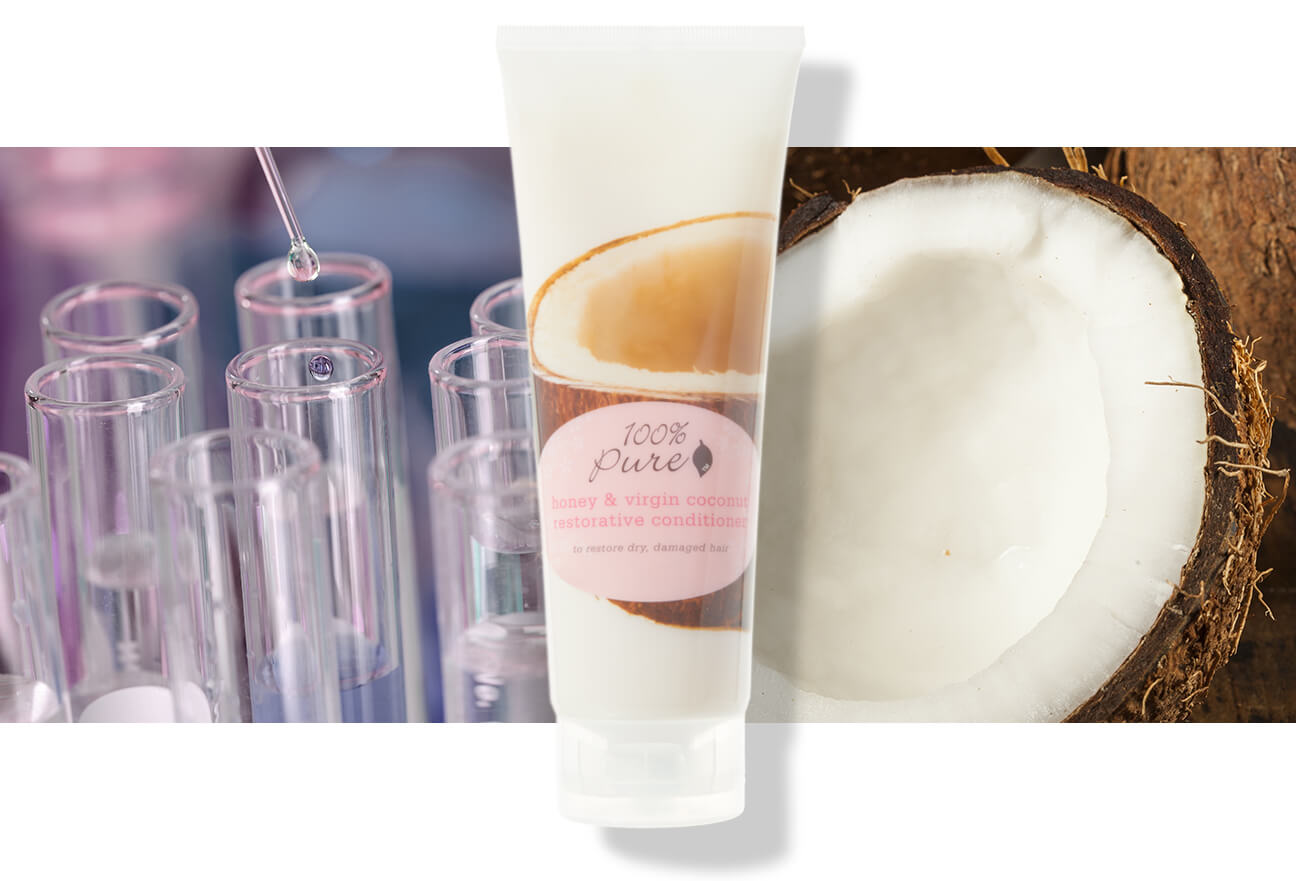
Instead of these stripping detergents, we use saponified coconut oil – a cleansing lipid derived from coconut oil that works into a lather like conventional “soap,” sans the stripping effects. Our ultra-foaming Coconut Shower Gel works into a rich lather thanks to saponified coconut oil, plus the formula incorporates rose hydrosol to replenish essentially fatty acids, and organic aloe leaf juice to soothe inflammation.
The same goes for our all natural shampoos – our Honey & Virgin Coconut Shampoo effectively dissolves product and oil buildup on the scalp with a formula of saponified coconut oil, honey (a natural antimicrobial ingredient) and rose hydrosol (hello hydration). Both are must-have basics for everyday body and hair care that won’t cause damage or irritation.
Synthetic Plasticizers
A key ingredient in most conventional nail polishes is dibutyl phthalate. Phthalates are a diverse group of materials that endow plastics with their signature flexible quality. They’re found in everything from toys to vinyl flooring, cleaning products, lubricating oils, food packaging – and they’re almost universally found in nail care products.
In nail products, dibutyl phthalate is used as a solvent for dyes and a plasticizer for texture. It’s absorbed through the skin, which is alarming, given that laboratory tests have shown it to cause developmental defects, changes in the testes and prostate, and reduced sperm counts. As much as we like a dazzling set of varnished nails, somehow these adverse health effects don’t seem like risks we’re willing to take. That said, we never include dibutyl phthalate in our Non-Toxic Natural Nail Polishes – they’re formulated sans phthalates and sans formaldehyde, because we believe that a mani-pedi shouldn’t be poisonous (call us crazy).
The takeaway? If you still want to enjoy wearing makeup without the adverse health effects, trading up to synthetic-free makeup is key! Keep the above blacklisted ingredients in mind when you’re thinking about the kinds of things you want to be applying to your skin. Regarding cosmetics and personal care products that can be absorbed into our bodies, it’s safest to stay synthetic-free as much as possible! Still itching to learn more about synthetic-free makeup? Read about asbestos in makeup and how we provide nourishing natural alternatives instead.
Frequently Asked Questions
How do synthetic dyes in makeup affect your skin and health?
Synthetic dyes in makeup can potentially irritate the skin, causing redness, itching, or allergic reactions in some individuals, and in certain cases, may be linked to more serious health concerns due to their potential to be absorbed into the body, with some studies suggesting potential links to endocrine disruption and even cancer, depending on the specific dye and its chemical structure; however, the exact effects can vary based on the individual and the concentration of the dye used and duration.
What are the benefits of using fruit pigments in cosmetics?
Fruit pigments in cosmetics can have many skin and health benefits, including natural and renewable dyes from fruits that are biodegradable, non-toxic, and renewable. The benefits also include fruit pigments that contain antioxidants that can help reduce inflammation, free radical damage, and reduce the risk of irritation. Other benefits include UV protection, such as some fruit pigments, like anthocyanins, may help protect skin from UV damage. Some fruit extracts, like acerola, may help lighten pigmented skin.
How does synthetic-free makeup benefit sensitive skin?
Synthetic-free makeup, also known as natural makeup, benefits sensitive skin by significantly reducing the risk of irritation and allergic reactions, as it avoids harsh chemicals like synthetic fragrances, dyes, and parabens which are common triggers for sensitive skin; instead, it often uses plant- and fruit-based ingredients that can soothe and nourish the skin, providing a gentler option for those with easily irritated complexions.
- Tags: December-2024, Makeup, Shopping Guides, Susies Lab
We carefully hand-select products based on strict purity standards, and only recommend products we feel meet this criteria. 100% PURE™ may earn a small commission for products purchased through affiliate links.
The information in this article is for educational use, and not intended to substitute professional medical advice, diagnosis, or treatment and should not be used as such.









